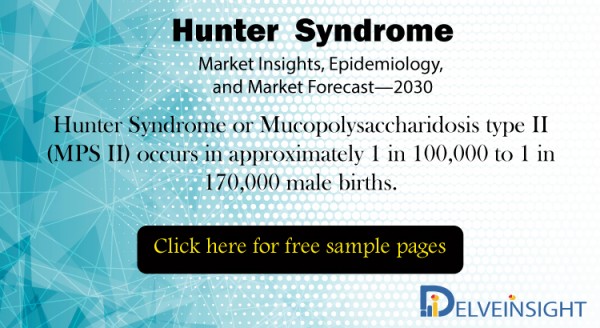Hunter Syndrome Market Insights, Epidemiology and Market Forecast-2030
(Albany, US) DelveInsight launched a new report on Hunter Syndrome Market Insights, Epidemiology and Market Forecast-2030
Some of the key facts of the report
1. Hunter Syndrome or Mucopolysaccharidosis type II (MPS II) occurs in approximately 1 in 100,000 to 1 in 170,000 male births.
2. MPS II is one of the most common mucopolysaccharidoses, with an estimated prevalence of 1 in 140,000-156,000 live births in Europe.
3. The highest birth prevalence was 0.84 for MPS II, accounting for 55% of all MPS. MPS I, III, and IV accounted for 15, 16, and 10%, respectively.
Key benefits of the report
1. Hunter Syndrome market report covers a descriptive overview and comprehensive insight of the Hunter Syndrome epidemiology and Hunter Syndrome market in the 7 MM (the United States, EU5 (Germany, Spain, France, Italy, UK) & Japan.)
2. Hunter Syndrome market report provides insights on the current and emerging therapies.
3. Hunter Syndrome market report provides a global historical and forecasted market covering drug outreach in 7 MM.
4. Hunter Syndrome market report offers an edge that will help in developing business strategies by understanding trends shaping and driving the Hunter Syndrome market.
“It is an inherited disorder of carbohydrate metabolism that occurs almost exclusively in males.”
Mucopolysaccharidosis type II treatment is multi-disciplinary and is best treated by a team of specialists, who have knowledge about the disease, and who can offer supportive and symptomatic care. Care is directed toward relieving the Hunter Syndrome symptoms. Enzyme replacement therapy (ERT) is now available for MPS II, and this treatment ameliorates the physical features of the disorder but can not treat the central nervous system.
Other MPSII treatments are symptomatic and supportive. These management interventions commonly cover developmental, occupational, and physical therapy. Hernias and joint contractures may be done by surgery. Carpal tunnel release can relieve carpal tunnel syndrome. Surgical implantation of a ventricular shunt may be utilised to treat possible hydrocephalus. Hearing devices may be prescribed for hearing loss treatment. Developmental, physical, and occupational therapy can be beneficial. Genetic counselling is recommended for families that have a child with MPS II. Alternatives like stem cell transplantation (STC) that are using the umbilical cord blood, peripheral blood hematopoietic cells or bone marrow have also been used, but they appear to offer limited clinical benefits in patients with this disease and have been associated with a severe risk of morbidity and mortality. Though enzyme replacement therapy by idursulfase may improve specific symptoms, it does not cross the blood-brain barrier (BBB) and will not alleviate neurological symptoms.
Hence, there is a major unmet need for a more efficacious therapy which is capable of crossing BBB. To overcome these challenges, researchers have focused on the development of well-tolerated therapies that can cross the blood-brain barrier. One approach that has been explored is the infusion of ERT into the cerebrospinal fluid, thereby enabling widespread distribution throughout the CNS. Other areas of research include the use of pharmacological chaperones, gene therapy, and substrate reduction therapy. Also, the unmet needs include lack of curative Hunter Syndrome treatment, lack of accurate diagnostic tests.
The launch of the emerging therapies is expected to significantly impact Hunter Syndrome treatment scenario in the upcoming years:-
Drugs covered
1. JR-141
2. GC1111B or Hunterase
3. RGX-121
And many others
The key players in Hunter Syndrome market are:
1. JCR Pharmaceuticals
2. Green Cross Corporation
3. Regenxbio Inc.
And many others
Table of contents
1. Report Introduction
2. Hunter Syndrome Market Overview at a Glance
3. Hunter syndrome Disease Background and Overview
4. Hunter syndrome Epidemiology and Patient Population
5. Epidemiology of Hunter syndrome by Countries (2017–2030)
5.1. United States- Epidemiology (2017–2030)
5.2. EU-5 – Epidemiology (2017–2030)
5.3. Germany-Epidemiology (2017–2030)
5.4. France-Epidemiology (2017–2030)
5.5. Italy-Epidemiology (2017–2030)
5.6. Spain-Epidemiology (2017–2030)
5.7. United Kingdom-Epidemiology (2017–2030)
5.8. Japan-Epidemiology (2017–2030)
6. Treatments & Medical Practices
7. Hunter syndrome Marketed Products
7.1. Elaprase: Shire
8. Emerging Therapies
8.1. Key Cross Competition
8.2. JR-141: JCR Pharmaceuticals
8.3. GC1111B or Hunterase: Green Cross Corporation
8.4. RGX-121: Regenxbio Inc.
9. Hunter syndrome Market Size
10. 7MM: Country-Wise Market Analysis
10.1. United States Market Size
10.2. Germany Market Size
10.3. France Market Size
10.4. Italy Market Size
10.5. Spain Market Size
10.6. United Kingdom Market Size
10.7. Japan Market Size
11. Market Drivers
12. Market Barriers
13. Report Methodology
14. DelveInsight Capabilities
15. Disclaimer
16. About DelveInsight
About DelveInsight
DelveInsight is a leading Business Consultant, and Market Research Firm focused exclusively on life sciences. It supports pharma companies by providing end to end comprehensive solutions to improve their performance.
Contact us:
Shruti Thakur
info@delveinsight.com
+919650213330
SOURCE DelveInsight
Media Contact
Company Name: DelveInsight
Contact Person: Priya Maurya
Email: Send Email
Phone: +919650213330
City: Albany
State: New York
Country: United States
Website: https://www.delveinsight.com/


